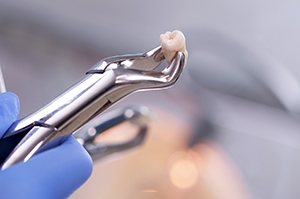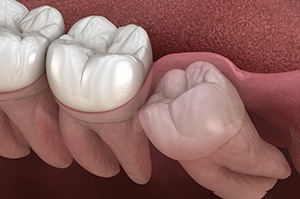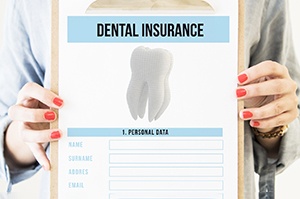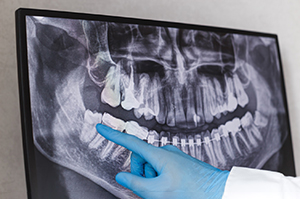Wisdom Teeth Extractions – Newington, CT
Resolve and Prevent Oral Health Problems
Wisdom teeth removal has become sort of a rite of passage for many adolescents and young adults. Quite a few older individuals also undergo this procedure. Still, you may wonder exactly what the wisdom teeth are and whether it is truly necessary to remove them. On this page, you learn the answers to those questions. You will also discover how the team at Family Dental Practice of Newington performs wisdom teeth extractions.
What Are the Wisdom Teeth?

The wisdom teeth are the third set of molars at the very back of the mouth. Most individuals have four wisdom teeth, one in each quadrant of the mouth. However, some people have more or fewer than that. The wisdom teeth get their name from the fact that they develop much later than all of the other teeth, usually when a person is in their late teens or early 20s — when they are older and “wiser” than they were in childhood.
The prevailing theory among scientists about why we have wisdom teeth relates to the diet of our ancient ancestors. They may have needed more teeth in order to properly chew a variety of rough foods. As generations have passed and food processing techniques have evolved, the wisdom teeth have become unnecessary.
Reasons for Wisdom Teeth Removal

Not everyone needs to have their wisdom teeth removed. For most individuals, however, their mouths are simply too small to accommodate a third set of molars. Therefore, their wisdom teeth may get stuck fully or partially beneath the gum line. Or, the teeth may erupt at an odd angle. Such issues can lead to a number of oral health complications, including:
- An increased risk of infection
- Overcrowding of nearby teeth
- Decay on the wisdom teeth and the adjacent teeth
- Bad breath due to food particles getting stuck around the wisdom teeth
When you visit us for routine checkups, we will keep an eye on your wisdom teeth. If we notice that they are causing problems, or we believe they may do so in the future, we will recommend extractions. Some patients choose to have their wisdom teeth removed as a purely precautionary measure.
The Extraction Procedure

We use both anesthesia and sedation to make our patients as comfortable throughout their treatment. During the extraction procedure, we may need to create an incision in the gums and/or break the wisdom teeth into pieces in order to remove them with as little damage to the surrounding tissue as possible. After the teeth are out, we close the incision.
Following your procedure, you should eat soft foods and avoid vigorous activity for several days. It is also important that you temporarily avoid straws because the suction action could disturb the blood clots at the extraction sites. You are encouraged to contact us if you experience any unusual pain or have other concerns during your recovery. Most patients are able to resume their normal eating habits and everyday activities within 7 – 10 days after their procedure.
Understanding the Cost of Wisdom Tooth Extractions

The cost of wisdom tooth extractions can vary from case to case. During your consultation, we will be able to provide you with a custom price estimate. We are also happy to assist you if you need a bit of help to afford your procedure. For example, we can file your insurance claims and help you to apply for financing. Although wisdom tooth removal might seem pricey at first, you can be confident that it is a smart use of funds that will ultimately benefit your oral health.
Factors That Can Impact the Cost of Wisdom Tooth Extractions

Some factors that can have a bearing on the cost of wisdom tooth extractions include:
- The number of teeth needing to be removed. Usually, we remove all four of a patient’s wisdom teeth at a time. However, not all patients have four wisdom teeth. Others choose to only get one or two removed at a time.
- Whether the wisdom teeth are impacted. Impacted teeth are stuck beneath the gumline, and they can be somewhat challenging to extract. The level of impaction also affects price. For example, if a tooth is partially erupted (called soft tissue impaction), it will cost less to remove than if it is fully embedded in the jawbone (called bony impaction).
- The type and amount of sedation used. Most patients prefer to be sedated during wisdom tooth removal so they can enjoy a comfortable treatment experience. The amount and type of sedation used can affect the total cost of your care. To save money, some patients choose to forgo sedation and simply be numbed instead.
- Who performs your surgery. We can perform most wisdom tooth extractions right here in our Newington dental office. If we must refer you to an outside specialist, you may end up paying more.
Does Dental Insurance Cover Wisdom Tooth Extractions?

You will need to check the details of your insurance policy to see how it applies to your procedure. It might be anywhere from 50% to 80% covered, depending on whether your wisdom teeth are impacted and other factors. Our team can assist you as you seek pre-authorization for your surgery. We can also file claims in your behalf and give you advice to help you get the most out of your insurance benefits.
Other Options for Making Wisdom Tooth Extractions Affordable

Here are a few additional provisions that might make it easier to afford your wisdom tooth extractions:
- Most patients are eligible for low-interest or no-interest financing through CareCredit, a third-party lender.
- Essential Dental Plan. This discount plan provides reduced fees on almost all the services available in our practice.
Wisdom Tooth Extractions FAQs

If you need to undergo wisdom tooth extractions, the team at Family Dental Practice of Newington is ready to assist you. In the meantime, you may want to gather more information about this procedure and what you can expect from it. To help you out, we have put together the following list of FAQs, along with succinct answers. Feel free to reach out to us directly if you do not see the answers to your specific questions.
Does Everyone Have Wisdom Teeth?
Wisdom teeth are quite common. Most people have four of them — one in each quadrant of their mouth. However, not everyone has them. According to one estimate, anywhere between 5% and 37% of people are missing at least one wisdom tooth. On the other end of the spectrum, some people have more than four wisdom teeth.
Whether you develop wisdom teeth, as well as the number of them you get, depends largely on your genetics. If you do not have them yet, it may be due to your age; they typically show up sometime between the ages of 17 and 21.
How Should I Prepare for My Wisdom Tooth Extraction?
Here are some practical steps you can take before your wisdom tooth extractions:
- Ask questions. Your dentist wants you to be well-informed, so feel free to bring up any questions or concerns that you may have.
- Arrange for a ride. If you will be sedated during your procedure, you should have a trusted adult available to drive you home afterward.
- Stock up on soft foods. You will have to stick to a modified diet for a week or so after your appointment, so you should purchase some soft foods beforehand. Things like brothy soups, applesauce, and pudding are good choices. Ice cream (without hard add-ins) is also acceptable in moderation.
- Do not smoke for at least twelve hours. Smoking can interfere with you bodily functions and adversely impact how anesthesia affects you.
Is Wisdom Tooth Removal Painful?
We strive to ensure our patients’ comfort during wisdom tooth surgery. Your mouth will be numbed, and sedation is available for most patients. You should feel little to nothing during your procedure.
After any anesthesia and sedation wear off, you can expect some soreness and general discomfort. Most patients are back to feeling normal within 7 – 10 days if they carefully follow post-operative instructions.
Should Wisdom Teeth Be Removed If They Do Not Hurt?
Your dentist may identify problems with your wisdom teeth that have not yet progressed to the point where you are in pain. They may recommend extractions as a way to spare you from future discomfort and prevent oral health complications.
Of course, not everyone needs to get their wisdom teeth removed. If you are not in pain, and your dentist has not identified any reasons to extract your third molars, they should be able to remain in your mouth without causing unpleasant consequences. Later on, if your dentist believes they may cause problems, removal will be recommended.
